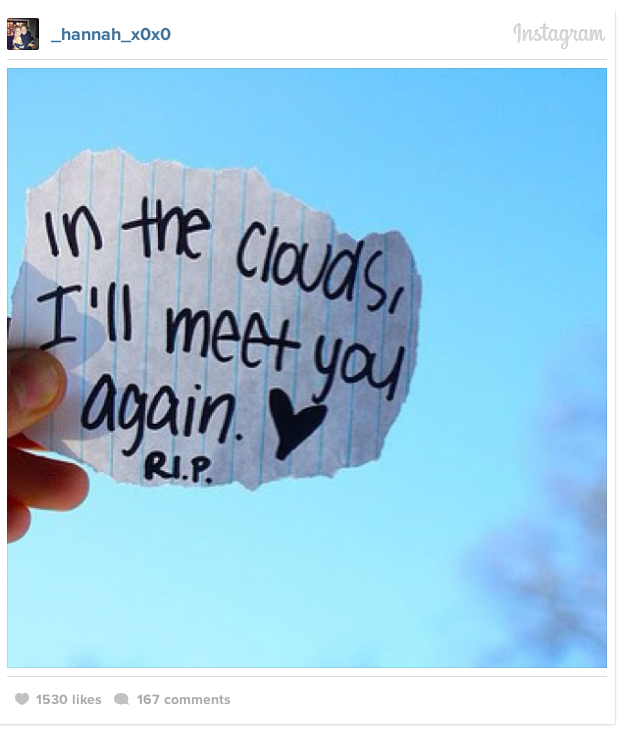Social Media and Serious Moments Do Not Mix
Hannah Anderson gets thousands of likes on her social media posts, like the one posted above. (Courtesy of Instagram)
September 9, 2013
I joined Twitter my freshman year of high school. Immediately, I was captivated by the world of social media. I wanted to post everything I did every second of the day. It didn’t matter if I was tweeting “at soccer practice!” or “mall with my mom”—everything was Twitter-worthy.

Fast forward nearly five years, my outlook on social media has changed dramatically.
While there is nothing wrong with using social networks to keep friends and family updated and involved in your life, social media and serious moments do not mix. When something significant happens, why is it everyone’s first reaction to turn to the Internet? With every break up comes a status bashing an ex. When a friend or family member is diagnosed with a terminal illness or dies suddenly, people jump to create a Facebook page in their name. Whether the posts come from a place of love or a place of hatred, serious (and oftentimes personal) moments need to stay off public forums.
I am still a fan of social networking, as I maintain the position of social media intern for two different brands. Through my internships I have witnessed firsthand how social networking can change the dynamics of a business. Sites such as Twitter and Facebook allow companies to directly interact with their consumers. Creating accounts on photography-based apps like Instagram expose potential customers to various goods and products on a daily basis. Social media is essentially free advertising that reaches millions.
Unlike personal accounts, major companies have strict guidelines for what they can or cannot post. They hire professionals to draw up tweeting schedules, approve of pictures and filters, and create an entire “voice” for their brand’s social media. Outside of professional use, however, proper social network etiquette is a bit unclear. We all have that friend who shares a little too much online. I used to think my posts from freshman year were irrelevant but there are people who tweet everything from “making a sandwich” to “going to the bathroom.” While this type of useless information may initially seem harmless, oversharing becomes questionable when it crosses into the serious side.
Hannah Anderson, a 16-year-old victim of a recent kidnapping, made headlines when she took to social media after her abduction. She used the popular question-and-answer website, ask.fm, to openly discuss the details of the kidnapping. Questions that ranged from “How did [your kidnapper] separate you from your mom and brother?” to “How did he keep the fire a secret?” Anderson shocked the public by answering honestly, painting a horrifying, unfiltered picture of the ordeal for anyone in the world to read.
Experts question her judgment in turning to social media. As one psychotherapist stated, “This is a 16-year-old who’s totally traumatized, she’s in a state of trauma and so she’s not thinking. Sometimes in a numb state, you do things that you don’t really consider the consequences.” Anderson just reacted as many teens do when facing hard times—using social networks and status updates to help cope emotionally. However, what happened to Anderson is a very serious matter and she should not have used social media as a form of therapy.
Our generation seems to be the main abuser of social media but we certainly aren’t the only ones—adult celebrities and professionals alike engage in this over sharing epidemic. Journalist Scott Simon live-tweeted his mother’s death, allowing his followers to experience his mother’s final moments tweet by tweet. Not only did Simon’s tweets show disrespect toward his mother and her passing but they also made readers uncomfortable. He turned what should have been a very private moment into a public event.
The New York Times caught onto this trend of oversharing and released an article to warn professionals that what they post on social media has a direct effect on their position in the work place. Even if you’re not tweeting anything that is insulting to a boss or co-worker, the New York Times advises leaving “emotional baggage outside the door” every time you post to social media. Because serious moments almost always come along with a wide range of emotions, social network users should avoid sites like Twitter when they are feeling especially sad or vulnerable.
Although some people view tweeting as therapeutic, the temporary satisfaction is not worth your entire newsfeed thinking you are a rash or insensitive person. What you post on social networks is out in cyberspace forever. Why would you want to scroll down your timeline and relive the hard times you so passionately tweeted about?
When it comes down to social media and serious moments, it’s wise to stop impulsively pressing that “send” button.












